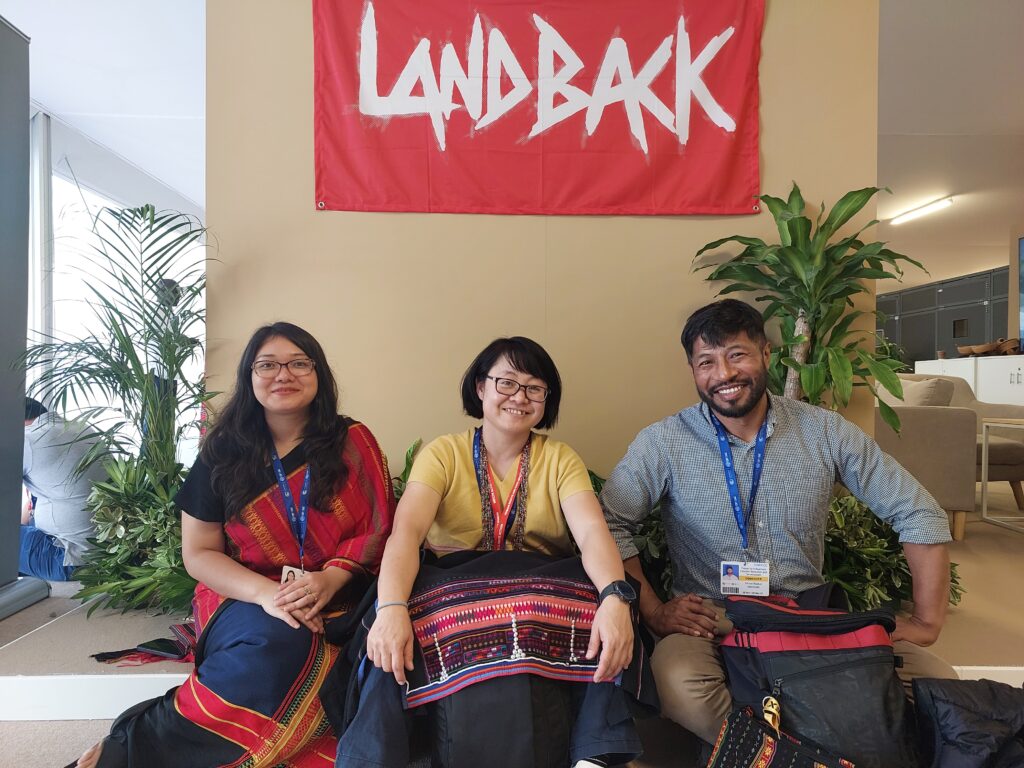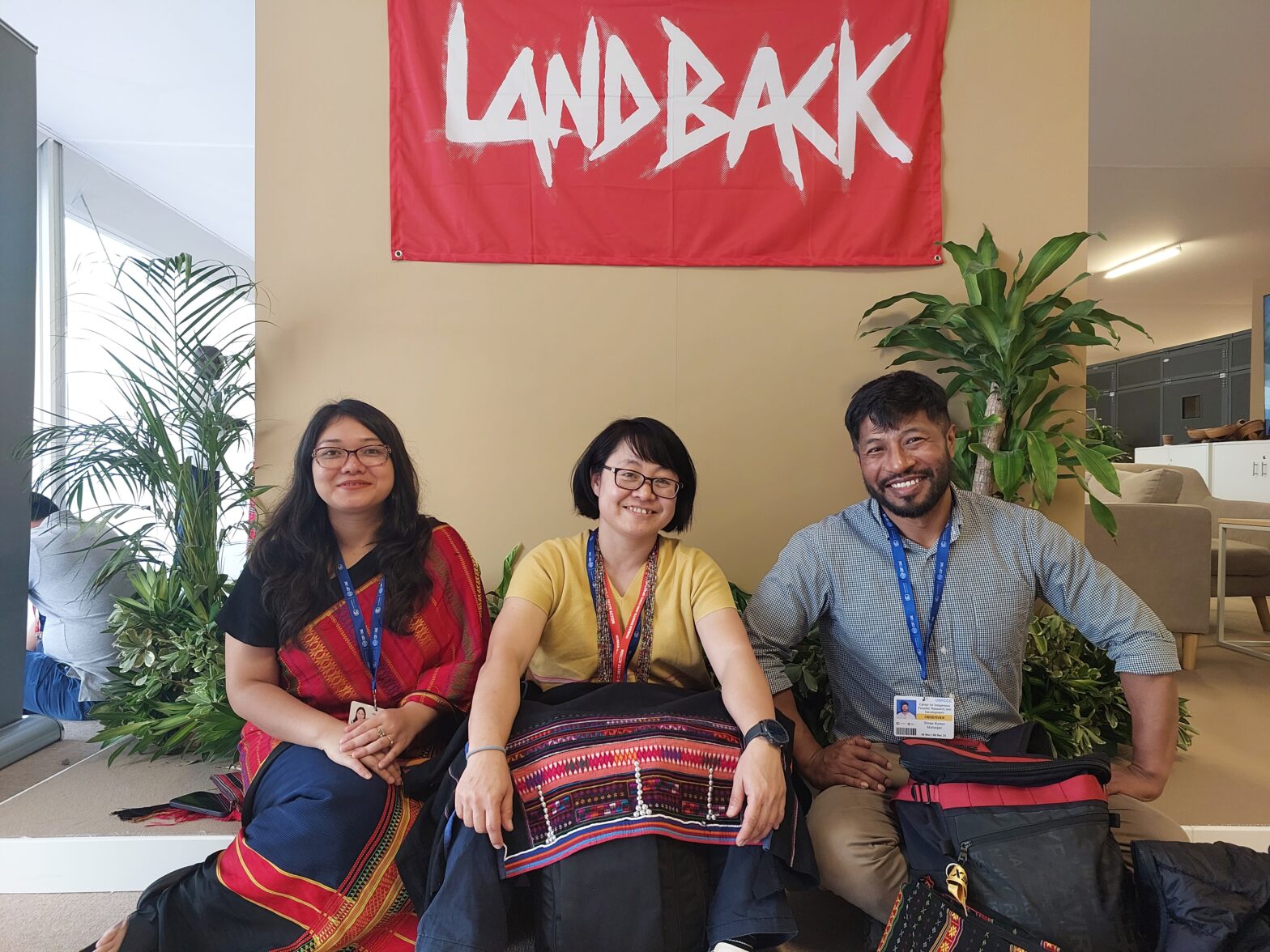By Jasmine Sone
At COP28, I had the opportunity to speak with three extraordinary people: Chandra Tripura, who advocates for the Tripura community in Bangladesh; Pirawan Wongnithisathaporn, who represents the Karen community in Thailand, specifically the Pga K’nyaw; and Shree Kumar Mahajan, who speaks for the Newar community in Nepal. Their stories brought to light the harsh realities that indigenous people confront as a result of climate change.

Chandra Tripura’s Advocacy: Bangladesh’s Indigenous Communities Struggle Amid Climate Turmoil
Chandra’s testimony sheds light on the multifaceted issues that indigenous communities in Bangladesh face amidst the relentless onslaught of climate change. Cyclones, floods, droughts, increasing temperatures, and rising sea levels are just a few of the climate-induced calamities the country is currently facing. Each of these disasters has left an indelible mark on the lives of indigenous communities.
Natural resources are fundamental to these societies’ sustenance, cultural traditions, and identities, and they are, therefore, intrinsic to their very being. However, because climate change affects them disproportionately, their very way of life is in jeopardy. As a result of these environmental disruptions, forced migration inflicts significant scars on their cultural practices, weakening languages and customs and leaving them devoid of what their ancestors previously had and treasured.
However, decision-makers and policymakers have frequently paid no heed to their predicament, allowing heinous activities such as land grabs and criminalization to continue when these communities express their environmental concerns. Chandra emphasizes the urgent need for inclusion, from local governance to national legislation, underscoring the importance of recognizing and embracing the indigenous way of life to preserve nature.
She strongly advocates for partnerships with indigenous groups, emphasizing their indispensable role as protectors of nature. Without their wisdom and practices, environmental protection remains an elusive aim. In an effort to bring attention to their voices and struggles to a global audience, the elders of these communities are taking their advocacy campaigns global, including declaring them at COP28.
Chandra also underscored the urgent need for indigenous populations to be recognized, included, and collaborated with. Their voices, infused with ancestral wisdom, not only protect their distinct traditions but also hold the secrets to nurturing and protecting our planet’s delicate ecosystems.
Pirawan Wongnithisathaporn’s Insights: Climate Perils Faced by Thailand’s Indigenous Voices
Pirawan’s statements echo the harsh realities that indigenous communities in Thailand face. The country is grappling with climate-related catastrophes, including droughts, widespread flooding, and increasingly intense forest fires. These environmental disruptions wreak havoc, resulting in a staggering loss of biodiversity, depleted water sources, and an alarming decrease in agricultural yields.
Women and children in affected villages face the weight of intensified disasters exacerbated by climate change, resulting in greater vulnerability, increased loss of lives, and growing food shortages. This struggle is compounded by Thailand’s alarming lack of inclusivity in climate change policies. The policies, which were developed without the participation of indigenous people, threaten to deprive them of their lands, making those who live there illegal and liable to arrest. Any dissenting voices opposing these measures are suppressed and arrested, effectively silencing their grievances.
Furthermore, the primary obstacle is the lack of recognition granted to indigenous communities. In Asia, only five countries recognize indigenous peoples: the Philippines, Japan, Cambodia (to a limited extent), Taiwan, and Nepal (which recognizes only 59 groups). Even in those countries, however, this acknowledgment fails to translate into substantive policy or legal representation. There is a severe absence of resources and support for these marginalized groups.
Pirawan’s resounding call is clear: indigenous communities must be recognized immediately. Their inclusion is a critical first step in rectifying these injustices. It is not just an issue of acknowledgment; it is also a matter of providing these communities with the necessary assistance and resources. Only by recognizing them can a route be established for their incorporation into policy frameworks, ensuring their voices are heard and their rights are upheld.
Shree Kumar Mahajan’s Perspective: Nepal’s Indigenous Frontline Against Climate Havoc
Shree’s insights provide a striking picture of the severe effects of climate change on indigenous communities in Nepal. The country is dealing with various climate-related issues, including floods, landslides, and water-related risks caused by rapid snow and ice melt in the mountains, combined with heavy monsoon rainfall in the foothills. These disasters result in a cascade of negative repercussions, including decreased agricultural productivity, food insecurity, strained water sources, and declining forests and biodiversity.
Living on the front lines of climate change, indigenous peoples bear a disproportionate share of the consequences due to their profound connection to nature. Their inherent connection to the land placed them at the center of these environmental catastrophes. On the other hand, in Nepal as well government policies are developed without consideration for them, driving these communities to migrate to urban areas, resulting in a devastating loss of their cultural identity.
Despite indigenous groups’ continuous advocacy efforts, local and global policies exclude them. Shree emphasizes the role of activism in amplifying their voices and getting necessary action. He highlights positive strides, such as the International Indigenous Peoples Forum on Climate Change (IIPFCC), also known as the Caucus, and its youth counterpart (IIYFCC), as crucial platforms for forging solidarity among indigenous people worldwide. Furthermore, initiatives for indigenous-led research and curriculum development, as well as for defining funding sources, highlight the capabilities of these communities when given favorable circumstances and supportive legislation.
However, significant challenges remain, such as a lack of financial support, language barriers—evident even at COP28 due to limited English proficiency—and resource scarcity. Furthermore, handling internal disputes among diverse indigenous communities across different countries makes establishing common ground for collective action difficult.
Shree’s incisive inquiry calls into question the constitutional alignment of rhetoric and action in Nepal. While the constitution advocates for equal rights for all, laws frequently deviate from these commitments. For example, Nepal is one of the few Asian countries to ratify the International Labour Organization Convention 169 (1989) or ILO 169. Yet, implementation and monitoring are woefully inadequate, resulting in the continuous exclusion of indigenous groups.
His emotional plea, which echoed the sentiments of Chandra and Pirawan, was for policymakers to fulfill their commitments and guarantee inclusivity in policy creation and execution, thereby building an environment in which indigenous voices are not only heard but also crucial in influencing the trajectory of climate action.
Urgent Call for Recognition and Inclusion
These narratives intersect at an essential juncture: the imperative to recognize and incorporate indigenous wisdom into climate policies and actions. Their inherent connection to nature contains significant insights to help navigate these turbulent times. The cry for recognition, as highlighted by Pirawan, Shree, and Chandra, isn’t merely a plea for survival; it’s a call to preserve ways of life in harmony with nature.
COP28 was a wake-up call, a sharp reminder of the importance of amplifying indigenous voices. Their insights are not only pertinent; they are essential. As defined by these individuals, the cornerstone is recognition—acknowledging their existence and harnessing their wisdom. Inclusion in discussions is not enough; inclusive policies that honor their heritage and center on their profound knowledge are also required. Their perseverance, difficulties, and deep connection with nature hold the blueprint for a more equitable existence for all beings in this world.
Recognizing indigenous communities is more than a step forward; it’s a pivotal step towards a more sustainable future—one that values diversity, reveres traditional forms of wisdom, and upholds the intricate tapestry of our shared world.
